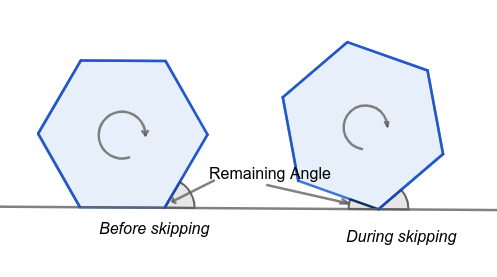Recently I was viewing this video which discusses Galileo's solution to Aristotle's wheel paradox and it got me thinking about when rolling turns into skidding. Why do geometric shapes with a finite number of edges skip and when an object has its several sides going to infinity, it skids.
Is there a precise number of sides to for which skips turn into skids in rolling motion? Or is this a consequence of the limiting behavior? How?
Reference:
Around 3:00 of this video


 A Pentacontagon 50-sided polygon
A Pentacontagon 50-sided polygon